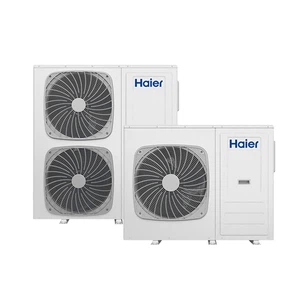1. Definition and Working Principle of Heat Pumps
A heat pump is an energy-efficient device that converts low-grade thermal energy into high-grade thermal energy. Its working principle is based on the reverse Carnot cycle, which involves the cooperation of four main components: the compressor, condenser, expansion valve, and evaporator. These components use a small amount of electrical energy to absorb low-temperature heat from the environment and transfer it to the place that needs heating. The specific process includes: the refrigerant absorbs heat in the evaporator and vaporizes into a gas, is compressed into a high-temperature and high-pressure gas by the compressor, then releases heat and condenses into a liquid in the condenser, and finally reduces pressure through the expansion valve and re-enters the evaporator to complete the cycle.
2. Application Fields of Heat Pumps
The application range of heat pumps is extensive, including:
Building Heating and Cooling: In cold regions, heat pumps can be used for indoor heating, and in the summer, they can serve as air conditioning.
Hot Water Supply: Heat pump water heaters use heat pump technology to efficiently heat domestic water.
Industrial Applications: In fields such as agricultural drying, food processing, and chemical industry, heat pump technology can effectively recover and utilize industrial waste heat.
3. Current Market Status of the Heat Pump Industry
In recent years, the heat pump industry market has continued to grow. In 2023, the sales volume of China's air source heat pump industry reached 31.02 billion yuan, a year-on-year increase of 11.9%. The domestic market scale was 24.66 billion yuan, a year-on-year increase of 18.7%. The demand for heat pump heating and hot water is particularly strong, with the heating segment growing at a rate of 29.2%.
4. Industry Development Trends
Technological Innovation: With technological advancements, the energy efficiency ratio of heat pump products will continue to improve, and the application of intelligent and networked technologies will enhance user experience.
Market Demand Growth: Global emphasis on energy conservation, emission reduction, and environmental policies will drive continuous growth in the demand for heat pumps.
Expansion of Application Fields: The application of heat pumps in buildings, industry, agriculture, and other fields will continue to increase, especially in low-temperature and high-humidity environments.
5. Challenges Faced by the Industry
Although the heat pump industry has a broad prospect, it still faces some challenges:
High Initial Investment Cost: The initial investment for heat pump systems is relatively high, which may affect consumers' willingness to purchase.
Technical Difficulties: In low-temperature or high-humidity environments, the efficiency of heat pumps may decrease, and technical difficulties still need to be resolved.
Incomplete Market Regulation: The performance and reliability of products from some small brands need to be improved, and installation and maintenance require professional technical personnel.




